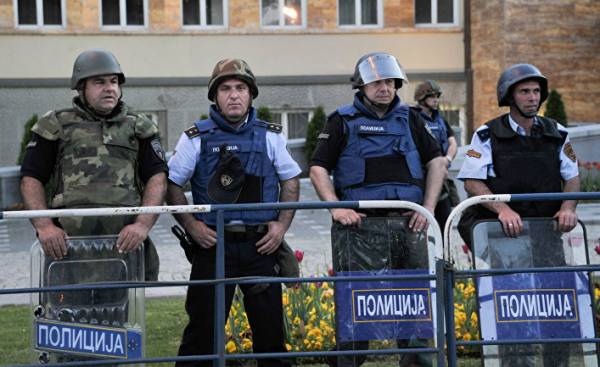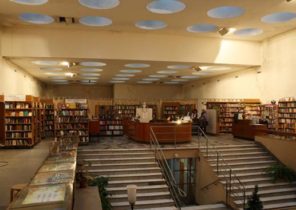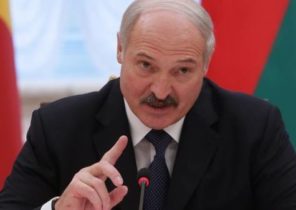
Macedonia — a small country even by European standards. And as if local analysts wish to see yourself in the center of a clash of civilizations, the Macedonian crises, even the deepest ones, are threatened in the worst case, only the nearest neighbors on a cold Balkan corner, but not global stability.
But a small example of Macedonia, where all in the mind, it is convenient to study how the mechanisms of international settlement. As a country of the European periphery comes to be on the brink of civil war, and as it pulled out.
Latest Macedonian crisis in this respect particularly revealing, because it was all international factors, typical for this part of the world. Here you and talk about the destructive intervention of Russia; and the utter helplessness of the European Union, in whose hands all the levers but press he could not; and tired of the US, which would love to forget about this distant and unimportant country for them, but they again have to dig through, because there’s no one else.
Ethnics and politics
The form in which the Macedonian crisis surfaced in recent weeks in the international media, perfectly fit in the traditional Western conception of the struggle between good and evil. The authoritarian power of the ethnic majority with the support of Russia oppressing the democratic opposition and her allied ethnic minority.
In the case of Macedonia, the role of the ruling oppressors-chauvinists played a former Prime Minister Nikola Gruevski and his party VMRO-DPMNE. Right with a strong nationalist bias — they relied on ethnic Macedonians make up about two-thirds of the population. Gruevski and his team ruled Macedonia continuously since 2006, having had over 10 years to collect a pile of allegations of corruption, harassment of journalists, election fraud, and so on.
On the other hand was the Macedonian social Democrats led by Zoran by Sevim and the party of the Albanian minority (about a quarter of the population of Macedonia). When in 2015, the media got information about corruption and other shenanigans of the government of Gruevski, the opposition for several months protested on the streets while supported by the EU have not achieved the early elections in December 2016.
First place in these elections, it still took the party of Gruevski, but alone she did not gain a majority in Parliament, and gained it the Union of social Democrats and Albanian parties. The Albanians in exchange for participation in the new government demanded more rights for their community and, indeed, federalization of Macedonia. The social Democrats agreed, but the President of Macedonia Ivanov Gjorge, people Gruevski refused to approve such a coalition, saying that the plans of the Albanians, contrary to the Macedonian Constitution.
So the Macedonian crisis came close to having to escalate into armed ethnic conflict. The Albanians demanded new rights, autonomy, the post of speaker in the government. The President and the old regime drove ethnic Macedonians that the opposition is national traitors, ready to sell part of the country of Albania. It got to the point that at the end of April, a group of Macedonian nationalists, apparently, not without the help of the old authorities, burst into Parliament and beat up opposition MPs, including the leader of the social Democrats, a potential Prime Minister zaeva.
Two years for two weeks
All this time — spring 2015 — the European Union tried to resolve the Macedonian crisis. Two more years from Brussels to Macedonia as a job, traveled the commissioners, envoys, foreign Minister Mogherini and even the President of the European Council Tusk. They brokered petitioned, worked out a compromise and proposed a roadmap. The result of two years of work by the Brussels diplomacy was the fact that the crisis that began with a peaceful and neticesi rallies in the capital, escalated into a tense inter-ethnic confrontation and bloody mayhem in Parliament.
After the parliamentary massacre, when it became clear that very bad things the West has revised its strategy in Macedonia. Instead of Tusk and Mogherini in Skopje came to the Deputy assistant Secretary of state for European Affairs and Eurasian Affairs Hoyt Brian Yee. The American has held meetings with the leaders of the major parties and the President Ivanov, after which they stated that the situation has gone too far, that it is necessary to work out a compromise and they are willing to soften their positions.
Then within a few days, the Albanian parties agreed that the federalization of Macedonia they are not so necessary. Elected in December, the new Parliament quietly voted speaker of Albanian, which, in turn, removed from your desktop flag of Albania. And on may 18 the President Ivanov entrusted the leader of the social Democrats Zaev the mandate to form a new government. Some minor squabbles on the way to the final stabilization is still possible, but overall the crisis, growing for two years, was resolved in two weeks.
Fortunately for the EU, few people in the world is closely following the developments in Macedonia, because it is difficult to imagine a more vivid example of the Declaration of the absolute helplessness of European foreign policy. Two years the President of the European Council, the EU high representative for foreign policy and a whole regiment of the Brussels bureaucrats could not do what Deputy assistant Secretary of state made in two weeks. Did not the President and Vice-President of the United States, and not Secretary of state, and not even the assistant Secretary. It was made by the Deputy assistant Secretary of state.
And it happened in a country that is not independent from the EU and almost anything from the United States. The EU accounts for about 70% of foreign trade of Macedonia, United States — slightly more than 1%. For EU member States account for more than 75% of accumulated direct foreign investments in Macedonia, on the United States — less than 2%. Every year, the EU allocates to the program of European integration in Macedonia, about 100 million Euro subsidies. Located in neighboring Kosovo peacekeeping force, KFOR, most members of which are EU countries. Finally, all the major Macedonian parties and more than 70% of the population in favour of an early accession country to the EU. And, in spite of such powerful leverage, Brussels for two years and failed to resolve the Macedonian crisis.
Election hatred
Even sadder is that the Macedonian crisis was not particularly complex and confusing. Stories about the bitter ethnic hatred between the Albanian and the Macedonian community is largely mythology that is convenient for local politicians. Of course, relations between the two ethnic groups in Macedonia is not very bright, but since the Ohrid agreement of 2001, they are more or less stabilized.
The current crisis for a long time had no relation to ethnic issues. On the contrary, it was rare in the Balkans as an example unethnical purely political confrontation, where both Albanians and ethnic Macedonians were divided into parties to the conflict fairly evenly. And only the EU’s early elections gave the local politicians a typical Balkan behaviour during the election campaign to strike in radical nationalism, and more radical, the more reliable.
And so out of elections in the Macedonian policy was not even close to fanatical ethnic hatreds — everything is fine with each other agreed. For example, the leader of the largest Albanian party, Ali Ahmeti, who in the last few months insisted that the Macedonian Albanians is vital federalization and the protection of chauvinist Gruevski. For eight years, from 2008 to 2016, his party joined the ruling coalition with Gruevski and Ahmeti himself was Deputy Prime Minister. And only when an early election for Ahmeti and his party, the threat of losing power became real, he left the government and began fighting for Albanian autonomy.
The same can be said about Gruevska. His party does not agree to assume the post of speaker of the Parliament of Albanian Talat Xhaferi — because he not only Albanian, but also fought in the Kosovo Liberation army. But somehow Gruevski remembered that this terrible Jafari was he in the government, Deputy Minister of defense.
Macedonian policy — not fanatics, but pragmatic and cynical people, the main purpose of which is not to lose power, and radical nationalism for them is just a reliable way to achieve this. In turn, the ethnic communities of Macedonia remember fighting 2001 and it does not want their recurrence. They absolutely do not want violence, if the local policy through the controlled media do not pump their paranoid scare stories about the threat of ethnic cleansing and disintegration of the country.
And again, the Brussels diplomacy are unable to use any hardened pragmatism of Macedonian politicians, nor the memories of the residents about the violence 2001, in order to prevent new clashes on ethnic grounds. This became possible only after American intervention.
The Russian threat
However, in addition to age-old ethnic hatred, the EU has been another excuse for their failures in Macedonia and destructive interference of Russia. The official statement of the Russian foreign Ministry on the situation in Macedonia, of which two years were only a few pieces have been interpreted so that Moscow supports discredited Gruevski as the Macedonian nationalist Slav and Orthodox. That the Kremlin seeks to intimidate ethnic Macedonians that the West supports in the Balkans, Albanians, and thus to reorient Skopje from Brussels to Moscow.
In some publications were even stories that the Russian Ambassador in Macedonia Shcherbak Gruesome threatened to ban the import of Macedonian agricultural products, if he did not change course with Pro-Western to Pro-Russian.
These rumors obviously come from the fact that Macedonia, together with Serbia and Bosnia, was one of the few European countries who did not join the EU sanctions against Russia. Accordingly, the Macedonian agricultural exports to Russia did not come under Russian countermeasures. Why it happened, just hard to say. Most likely, the Macedonian leadership, exhausted by the snail’s pace of European integration, hoped to get in exchange for joining the sanctions, at least some progress in the negotiations on accession to the EU. And in early 2015, the country began a severe political crisis, so all was not sanctions.
But in any case, the threat of an Ambassador to impose an embargo on Macedonian agricultural exports to Russia would have sounded ridiculous because such exports are almost nonexistent. Russia’s share in the Macedonian exports in General slightly more than 1%. The share of agricultural products in this stream is about one third (mostly nuts and citrus). That is, the ban would affect about 0.3-0.4% of the Macedonian exports. How can you seriously threaten embargo in such tiny scale cooperation?
Statements by Russian foreign Ministry really hinted that the West has organized protests against Gruevski and the West, achieving branch of Kosovo continues to support in the Balkans are Orthodox Slavs and Albanians. And if in Macedonia someone still did not understand transparent hints that the Russian media in the region have direct text explained about the Western project of a greater Albania.
But all this is, first, the traditional Moscow’s position that it holds already for many years, and not only in the Balkans. And secondly, the rhetoric of the foreign Ministry was not accompanied by any practical steps.
Russia always tend to blame the West in any anti-government protests, and Macedonia in this respect does not differ from Burma or Libya. The impact of these allegations on the situation in Macedonia tends to zero in the background of the efforts of the Gruevski, who for months through state-run media pumped up the population with stories about what is Soros paid for the protests.
The stereotype that the West in the Balkans supports Albanians against Orthodox Slavs, — he, of course, very nice Moscow, but his popularity in the region is not the Russian credit. And the Serbs, and the Macedonians themselves remember how in 1999, the West bombed Serbia to support the Albanian separatists in Kosovo, and in 2001 forced the Macedonians Ohrid agreement, which sharply expanded ethnic rights of the Macedonian Albanians. Here you can discuss how the intervention was fairly and humanely, but the fact that in both conflicts the West supported the Albanians and the Serbs and Macedonians remember themselves, without Russian reminders.
If we talk about foreign interference in the internal politics of Macedonia, then you need to pay attention to the President of Kosovo Hashim Thaci, who called on Macedonian Albanians to “take their rights into their own hands”. Moreover, many political leaders of the Macedonian Albanians is a former subordinates Thaci in the Kosovo Liberation army.
Or Prime Minister of Albania EDI Rama, through whose mediation in Tirana of the party of the Macedonian Albanians developed a common “Tirana platform” with the requirement of federalization.
Although what is there to complain about to the neighbouring Albanians, when the Minister of foreign Affairs of Austria Sebastian Kurz openly participated in the election campaign Gruevski before the early elections in December 2016. Spoke at a party rally, said that in Macedonia when Gruevska everything is fine, the country is getting closer to joining the European Union.
Unlike Kurtz nor Minister Lavrov or anyone else of official representatives of Russia has not campaigned for any of the Macedonian parties. In fact, the Macedonian policy about this and didn’t ask, because Macedonia is not Serbia. In spite of Slavdom and Orthodoxy, contacts with Russia, there are very poorly developed, and the idea of a Pro-Russian orientation in foreign policy is not popular. All the major parties of Macedonia (right and left, Macedonian and Albanian), as well as the vast majority of the population were in favour of an early accession country to the EU and NATO. Both for the inhabitants of Macedonia — issues non-partisan consensus to abandon these purposes means at least for Gruevski, at least for zaeva true political suicide.
The main cause of the current Macedonian crisis, not the machinations of Russia and in the age-old enmity between Albanians and Macedonians. And the fact that the EU is constantly cheating on Macedonia with stories about its imminent European future. In 2001 the Ohrid agreement was concluded under the promise of the EU that only when they are executed Macedonia can join the EU. The Macedonians agreed and regularly fulfill this condition. Since it’s been about 16 years — where is the promised entry? Still not even called the approximate date. Like a tiny two-million Macedonia will create for the EU some very heavy financial commitments.
When people are waiting for something promised, and that is all the time in society inevitably raises the tension, the frustration, the search for the guilty. This happens not only in Macedonia and in all the Western Balkans. And, judging by the two-year Macedonian crisis, the EU is unable to offer any solutions to these problems. This again will have to deal with US.
Deputy assistant Secretary of state Hoyt Brian Yee moved from Macedonia to Albania. There he agreed with the leaders of the largest parties that they will find a compromise on judicial reform, abandon the threat of a boycott of the next election and stop months-long street protests in Tirana. This was achieved in one day of negotiations. Mediators from the EU could not achieve any results in three months.







